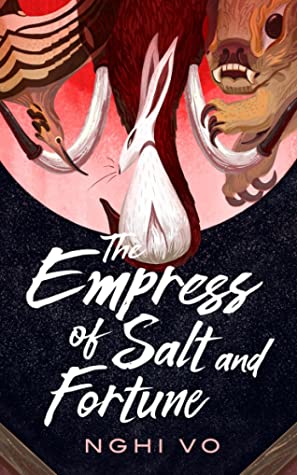- The Good: Beautiful, atmospheric prose
- The Bad: Emotionally distant
- The Literary: An homage to traditional oral storytelling
The emperor’s new wife In-yo, a young royal from the far north, must choose her allies carefully in the foreign land she now calls home. She befriends one of her handmaidens, a young girl called Rabbit whose parents sold her to the palace for five baskets of dye. Years later, a much older Rabbit reveals the true story of In-yo and her behind-the-scenes political machinations in a fantasy empire reminiscent of imperial China.
With roots in the silk-punk fantasy genre, The Empress of Salt and Fortune is a delight of atmospheric, evocative storytelling. Chih, the traveling cleric who finds Rabbit, internalizes the traditional oral storytelling in dreams as it is uncovered and revealed in bite-sized chapters. Each chapter peels another layer away and moves toward a central pivoting moment in both In-yo and Rabbit’s lives that changes the empire forever. The world building will make you think you’ve read a full-blown imperialist high fantasy tome, but the ethos and culture of this male-dominated Chinese-esque empire fits neatly into a novella.
I’m left with the feeling of listening to the wind whistle through trees while holding a cup of hot tea that only a slow story of sacrifice provides. This one is also feminist and queer in a quiet way, in which power is wrought with memory and the myths we make. A small box of treasures dusted off can recover hidden memories in one’s own mind.
The time spent in the domestic affairs of Rabbit and Chih grounds the political intrigue of In-yo. Unfortunately, Rabbit as a narrator distances the action and details of In-yo’s story, and it’s unclear who exactly is the protagonist. In fact, all the characters are distant and quiet, which dulls the emotional resonance.
Recommended as an empowering feminist fantasy rooted in Taiwanese-Chinese history! But you’ll be better off reading this than listening to an audiobook.
